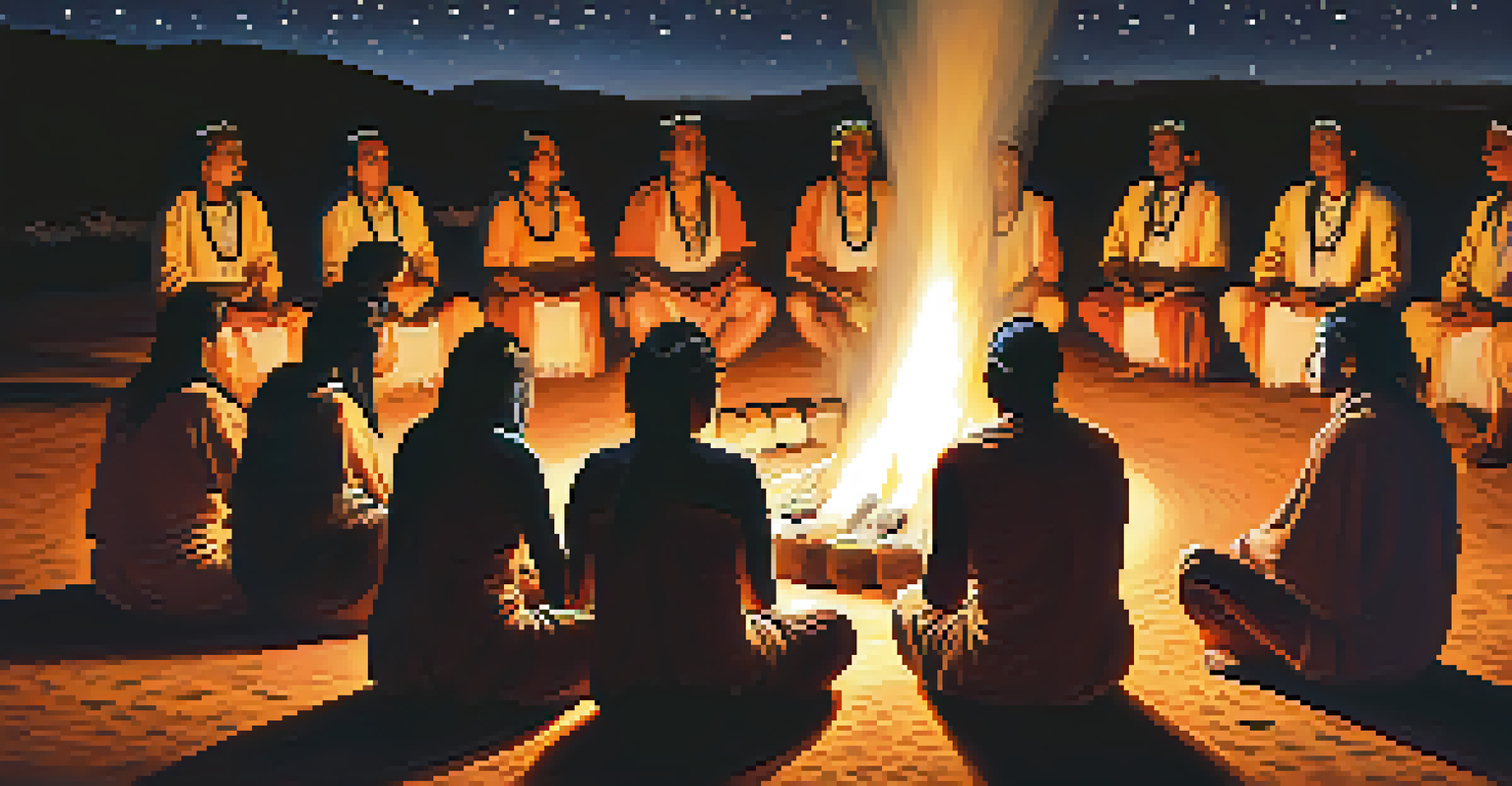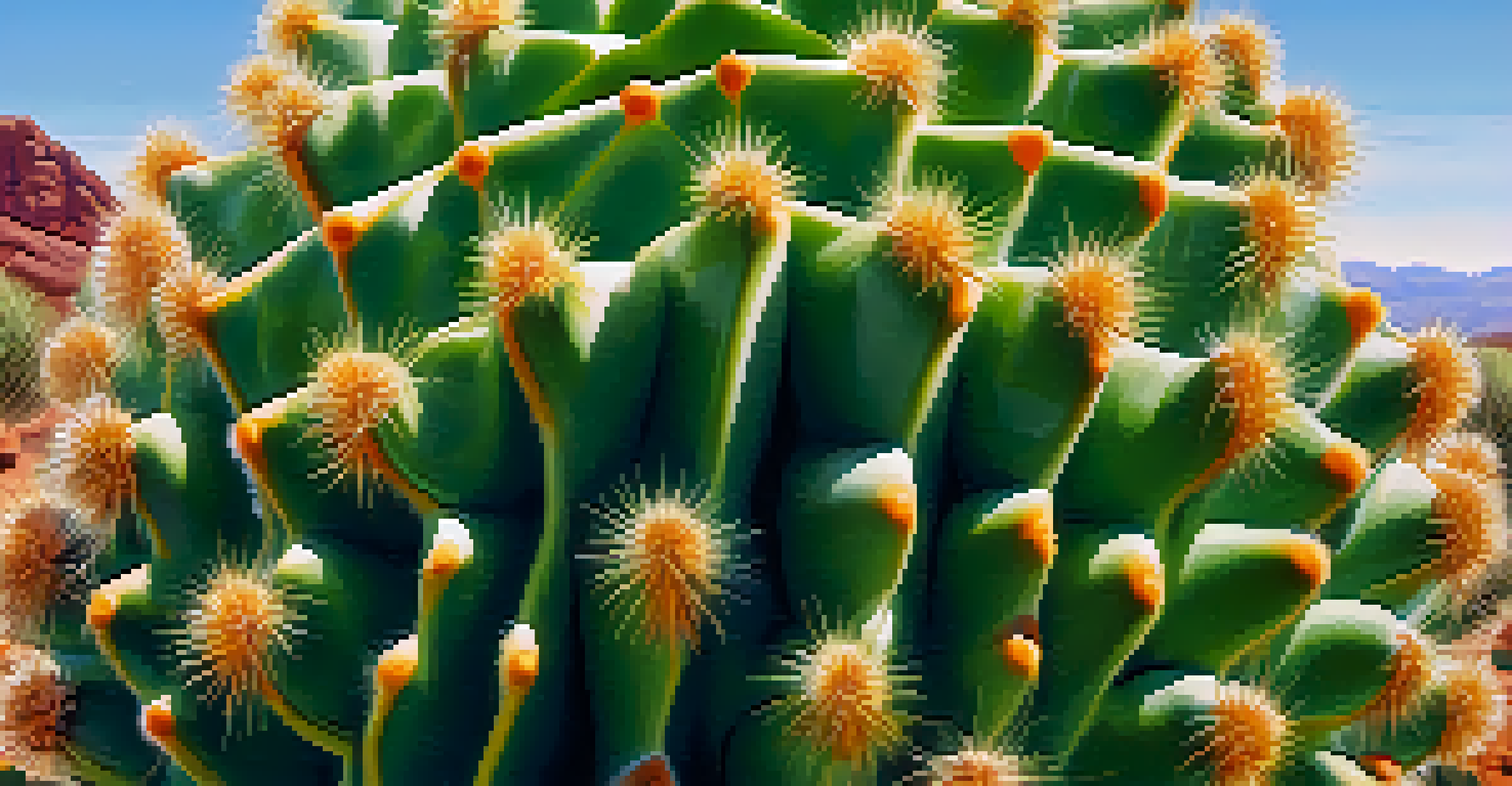Peyote and Its Role in Indigenous Philosophical Traditions

The Cultural Significance of Peyote in Indigenous Communities
Peyote, a small cactus native to Mexico and the southwestern United States, holds deep cultural significance for many Indigenous communities. It has been used for centuries in various spiritual and healing rituals, acting as a bridge between the physical and spiritual worlds. For many tribes, such as the Huichol and the Navajo, peyote is more than just a plant; it embodies their identity and connection to nature.
Psychedelics can help us to understand the nature of reality and our place within it.
The ritualistic use of peyote often involves communal gatherings where participants engage in ceremonies aimed at spiritual enlightenment and healing. These gatherings foster a sense of community, allowing individuals to share their experiences and deepen their understanding of life's mysteries. The ceremonies often include singing, drumming, and storytelling, which are vital in preserving oral traditions and cultural heritage.
Moreover, peyote is frequently viewed as a teacher, imparting wisdom and guidance to those who partake in its use. The experiences can vary widely, often leading to personal revelations or insights that individuals integrate into their daily lives. This transformative aspect underscores the vital role peyote plays in the philosophical frameworks of various Indigenous cultures.
Peyote and Its Role in Spiritual Practices
In many Indigenous belief systems, peyote is considered a sacred gift from the Creator, facilitating communication with the spiritual realm. This psychedelic cactus is often consumed during ceremonial rites, where its psychoactive properties help participants enter altered states of consciousness. In these states, individuals seek guidance, healing, and clarity on personal or communal issues.

The spiritual use of peyote is not taken lightly; it requires respect, preparation, and a deep understanding of its significance. Participants often undergo a period of fasting and meditation before the ceremony, allowing them to approach the experience with the right mindset. The intention behind the use of peyote is crucial, as it can greatly influence the journey and insights gained during the experience.
Peyote's Cultural Significance
Peyote serves as a crucial element in the spiritual and healing practices of Indigenous communities, fostering identity and connection to nature.
Additionally, the teachings received during peyote ceremonies are integrated into the community's moral and ethical frameworks. This integration helps reinforce the values of compassion, respect for nature, and interconnectedness among all living beings. Thus, peyote not only serves as a tool for individual exploration but also strengthens communal bonds and shared philosophies.
Philosophical Implications of Peyote Use
The experiences induced by peyote often prompt philosophical reflections on existence, purpose, and the nature of reality. Many individuals report profound realizations regarding their place in the universe and their relationships with others, leading to a deeper understanding of interconnectedness. This introspective journey aligns closely with Indigenous worldviews, which emphasize harmony with nature and respect for all forms of life.
The medicine of the future will be the medicine of the spirit.
Furthermore, peyote challenges conventional Western notions of reality by inviting participants to explore alternative perspectives. This exploration can lead to a broader understanding of consciousness, encouraging individuals to question accepted beliefs and explore the complexity of the human experience. Such philosophical inquiries remind us that there is much more to life than what is visible or tangible.
In this way, peyote becomes a catalyst for philosophical discourse within Indigenous cultures, fostering discussions about the essence of being and the nature of the universe. It encourages a dialogue that transcends generations, linking the past with the present and future, and allowing Indigenous philosophies to evolve while remaining grounded in tradition.
Peyote's Role in Healing Practices
Beyond its spiritual implications, peyote is also renowned for its healing properties. Many Indigenous cultures incorporate peyote into traditional healing practices, believing it can address not only physical ailments but also emotional and spiritual distress. Healers often use peyote as part of a broader therapeutic approach, which includes rituals, prayers, and communal support.
The healing ceremonies typically involve the guidance of an experienced leader who facilitates the experience, ensuring that participants feel safe and supported. This communal aspect of healing is vital, as it reinforces the idea that individuals are not alone in their struggles. Sharing personal stories and insights can foster a sense of belonging and collective healing.
Healing and Transformation
The use of peyote in ceremonies not only promotes individual healing but also strengthens communal bonds through shared experiences.
Moreover, the insights gained during peyote ceremonies can lead to transformative life changes, helping individuals confront trauma, addiction, or mental health challenges. This holistic approach to healing aligns with Indigenous perspectives on wellness, which encompass the mind, body, and spirit, reinforcing the importance of nurturing all aspects of one's being.
Challenges Facing Peyote Traditions Today
Despite its rich cultural heritage, the use of peyote faces significant challenges in the modern world. Legal restrictions and the growing commercialization of peyote can threaten traditional practices, making it increasingly difficult for Indigenous communities to access this sacred plant. Additionally, the rising demand for peyote among non-Indigenous individuals can lead to overharvesting, endangering the plant's survival.
Indigenous communities are working tirelessly to protect their rights to practice their traditions, often advocating for legal recognition of peyote's cultural significance. Efforts include educating the public about the importance of preserving these practices and the potential consequences of exploitation. By raising awareness, Indigenous leaders aim to create a more respectful dialogue around peyote use and its role in cultural identity.
Furthermore, as younger generations seek to reconnect with their heritage, there is a growing need for education about the proper use and significance of peyote. By passing down knowledge and practices, Indigenous communities can ensure that their traditions endure, fostering a deeper understanding of the plant's sacredness and its role in their philosophical traditions.
Modern Interpretations of Peyote in Philosophy
In contemporary discourse, peyote has begun to capture the attention of philosophers and researchers interested in altered states of consciousness. Scholars are exploring how peyote experiences can contribute to discussions on the nature of reality, consciousness, and the human experience. These modern interpretations often draw parallels between Indigenous philosophies and contemporary existential questions.
Moreover, the study of peyote's effects on the brain and consciousness has opened up avenues for understanding its potential therapeutic benefits. Researchers are examining how peyote can aid in mental health treatments, particularly for conditions like PTSD and depression. This intersection of traditional knowledge and modern science highlights the importance of preserving Indigenous wisdom while exploring its relevance in today's world.
Challenges to Peyote Traditions
Modern legal restrictions and commercialization threaten traditional peyote practices, prompting Indigenous communities to advocate for their cultural rights.
As more people become aware of peyote's significance and potential, there is a growing movement to respect and protect Indigenous practices surrounding its use. This newfound interest can foster greater appreciation for Indigenous philosophies and the holistic approaches to understanding life that they offer. Ultimately, peyote serves as a bridge between past traditions and contemporary philosophical inquiries, enriching our collective understanding of existence.
The Future of Peyote in Indigenous Philosophical Traditions
Looking ahead, the future of peyote in Indigenous philosophical traditions will depend largely on the efforts of Indigenous communities to reclaim and protect their cultural practices. Advocacy for legal rights and recognition is essential to ensure that peyote ceremonies continue to thrive. Community-led initiatives focused on education and cultural preservation can help bridge the gap between generations.
Furthermore, as society becomes more open to exploring alternative healing modalities, there is potential for greater respect and appreciation for peyote's role in Indigenous cultures. This shift can foster more meaningful conversations about the importance of preserving traditional practices and the knowledge that accompanies them. By engaging with these philosophies, society can gain insights that enhance our understanding of well-being and interconnectedness.

Ultimately, peyote will continue to serve as a powerful symbol of resilience and cultural identity for Indigenous peoples. Its role in shaping philosophical traditions and providing spiritual and healing insights will remain vital in navigating the complexities of modern life. As we honor and respect these traditions, we not only support Indigenous communities but also enrich our own understanding of life’s profound mysteries.